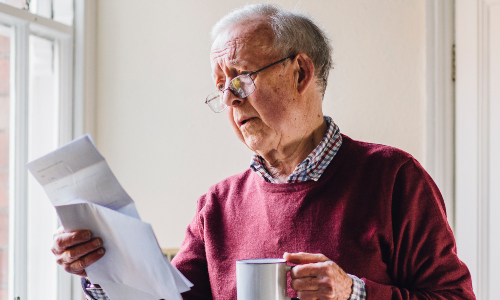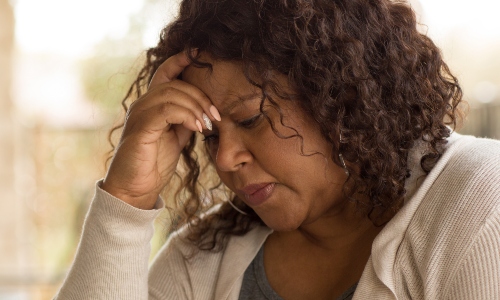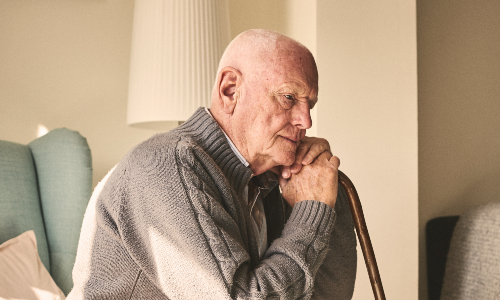Age UK research has revealed the ongoing impact of the cost of living crisis on the day-to-day lives of older people.
According to this research, 91% of respondents told us that they were worried about the cost of living to some extent, and a quarter (25%) of people aged 50 and over told us it had been affecting them severely or very severely. The figure was higher for people who were from minoritised ethnic groups (46%), people aged 50-59 (37%), people with long-term health conditions (36%), those who were more disadvantaged (34%), and unpaid carers (34%).
Within this research we also asked how increased costs were affecting respondents’ health, care and wellbeing. There are established links between poorer health outcomes and financial disadvantage, and the implications of this are further highlighted in our research.
Sacrifices at the expense of wellbeing
Our research revealed the variety of ways that older people have had to cut back and make sacrifices during the cost of living crisis, very often at the expense of their own mental and physical health. One key finding is that older people are delaying retirement or going back to work to increase their income – even if their health makes this challenging. For those who are living with long-term health conditions, suitable physical activity can be helpful in managing symptoms, as well as being important for general health and wellbeing. But that, too, has often suffered, as some people told us they have had to cut back on exercise and physical activity due to the cost.
Older people’s mental health has also taken a hit, as many told us that they were socialising less and had cut back on doing the things that they enjoy. Transportation costs have risen and social activities are no longer affordable, which left some people feeling increasingly isolated from friends and family, leading to greater levels of loneliness and poorer mental health.
As well as reducing activities that boost physical and mental health, many older people have been cutting back on support that’s often desperately needed. Support services for older people range from help with important household tasks – like cleaning, gardening, and general help around the home – to more individual care like preparing meals, help with hygiene, and support to get out and about. Older people have told us that they are having to decrease the amount of support they receive in order to cover bills, leaving many without the help they need to wash or cook.
Cutting back on this crucial support only further impacts older people’s health and quality of life. In addition to reducing care, too many people have also been forced to eat less food and spend less on the essentials. 18% of people aged 50 and over have been skipping meals in order to keep costs down, and 17% have been reducing or stopping spending on medications and specialist support. Among those who have been forced to use savings to cover bills, many expressed concerns about how sustainable this would be in the long term.
In recent winters, we have heard of older people being fearful of putting their heating on due to high energy costs. This winter has been no different – 75% of people aged 50+ reported turning down and reducing the hours they had their heating on. While this may be the case for many of us, this is particularly worrying for older people who are at much higher risk of severe health implications from being too cold and who generally tend to spend more time in their homes.
Not a new issue
It is important to acknowledge that while the cost of living has made life more challenging for older people, these are issues that have been faced by financially disadvantaged older people for many years. Financial disadvantage is not just about being on a low income; for many older people who are living with disabilities or with long-term health conditions, the need to pay for care, power medical equipment or keep a house warm can all take a huge financial toll.
Health and care professionals have told us that they are frequently hearing from older people about their financial struggles, and what this means for their health. But while the link between financial disadvantage and poor health remains as strong as ever, there is some support available.
Around £2.8 billion of Pension Credit and Housing Benefit is unclaimed every year. Feedback from Age UK services providing information and advice shows that there are also older people missing out on Attendance Allowance and Personal Independence Payment or Carer’s Allowance. Given the issues highlighted by our research and the increasing costs in all areas of life, it is more important than ever that older people know how to access the money they are entitled to.
Many people do not have the right information on the types of benefits available, whether they are eligible to claim them, or how to go about receiving the money they’re owed – but Age UK can help.
We have free resources available
Age UK has resources to help older people claim the money they're entitled to. Our free advice line is available to call every day of the year, while our benefits hub and benefits calculator can help identify the different types of benefits available and who is eligible to claim them.





